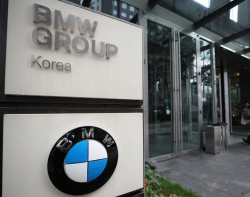
— BMW Korea is again under suspicion of wrongdoing, this time as prosecutors allege the automaker may have covered up safety defects that caused car fires.
Korean prosecutors raided BMW locations and an internet server maintained by the automaker.
According to Korean authorities, BMW collected about $56 million by marketing and selling vehicles with safety problems.
The automaker has been under the microscope of the Ministry of Land, Infrastructure and Transport concerning exhaust gas recirculation (EGR) systems.
BMW recalled 1.6 million model year 2013-2018 vehicles worldwide in 2018 because of problems with the EGR systems. BMW determined the EGR coolers created hot particles that melted the intake manifolds and caused vehicles to burn. South Korean regulators even banned specific BMW models from the roads after 40 car fires were caused by the EGR systems.
But prosecutors believe BMW concealed important data and information about the vehicle fires based on reports filed by Korean police who are investigating the automaker.
A previous investigation was opened after investigators realized vehicles that had received recall repairs still caught fire. Officials believed it may have been due to faulty repairs of the EGR systems, but regulators found at least six car fires weren't caused by the EGR systems.
BMW had argued the vehicles caught fire for various reasons unrelated to the recall, and government investigators reached the same conclusions with six of the fires.
Regulators found BMW was correct that each fire was caused by various problems, including the turbocharger, diesel particulate filter trap, catalytic converter and a lack of maintenance. Regulators also determined one of the burned cars wasn't even equipped with an EGR system.
The automaker has been in trouble before based on illegal actions related to emissions systems, costing BMW millions of dollars in penalties.
In addition, at least six BMW executives were sent to prison for their role in selling vehicles with illegal diesel emissions.




